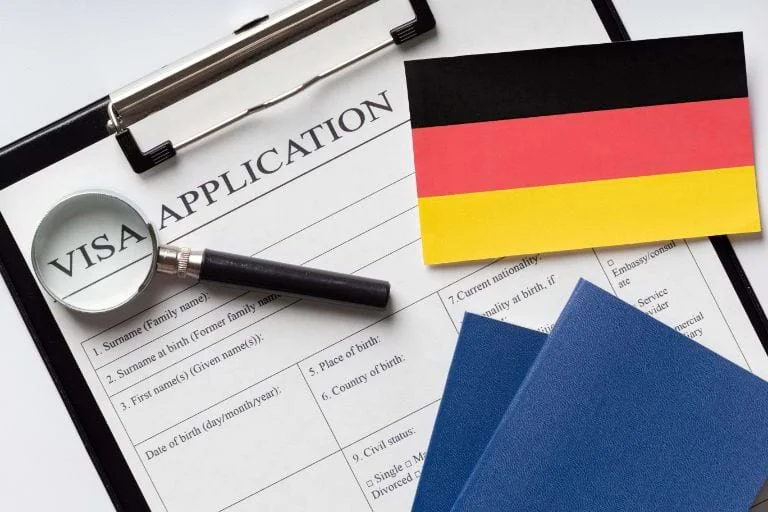Germany has announced new work visa reforms in 2025 to fill critical job gaps in healthcare, construction, IT, and manufacturing. The country is making it easier for foreign professionals to move to Germany, simplifying the visa process and increasing opportunities for skilled workers.
According to the European Labour Authority, Germany is experiencing shortages in more than 70 professions, with some of the most affected sectors being healthcare, engineering, transportation, and construction. The government hopes these reforms will make Germany a more attractive destination for foreign workers looking to build careers.
Join our WhatsApp ChannelKey Work Visa Reforms in 2025
Germany’s work visa policies have undergone major changes to meet workforce demands. These include new visa categories, an increase in skilled worker visas, and relaxed qualification requirements for non-EU workers.
One of the most significant changes is the introduction of the Opportunity Card, a new points-based visa system. This card allows job seekers to stay in Germany for up to a year while searching for employment. Points are awarded based on qualifications, work experience, age, and language skills.
READ ALSO: List Of Countries Where Work Visa Requirements Are Similar
Additionally, Germany has increased the number of skilled worker visas by 10% in 2025, following the issuance of 22,000 extra visas in 2024. Non-EU workers also benefit from relaxed qualification recognition, meaning they can now apply for jobs without prior approval of their credentials.
A new salary threshold has been set at €43,470 per year for skilled workers applying for a work visa. This measure aims to ensure that foreign workers receive fair wages. Furthermore, improved family reunification rules will allow skilled workers to bring their families more easily, aiding integration into German society.
To speed up the visa process, Germany has also launched a digital portal that allows applicants to complete and track their work visa applications online. This is expected to reduce waiting times and streamline the approval process.
Sectors with High Demand for Skilled Workers

Germany’s labour shortage presents significant opportunities for foreign professionals in multiple fields. Some of the most affected industries include:
- Healthcare: There is high demand for nurses, medical technicians, physiotherapists, and dental assistants.
- Engineering & IT: Software developers, system analysts, and engineers in electrical, civil, and mechanical fields are needed.
- Manufacturing & Construction: Germany is seeking machine operators, electricians, plumbers, bricklayers, and construction supervisors.
- Transportation & Logistics: The country has a growing need for truck, bus, and railway operators.
- Education & Skilled Trades: Teachers, clerks, firefighters, and food preparers, including bakers and pastry chefs, are in demand.
Germany’s ageing population and low birth rate have increased pressure on these industries, leading to urgent hiring needs.
Different Work Visa Pathways
Germany offers several types of work visas depending on qualifications and employment status. These include:
READ ALSO: List Of Easiest Countries To Get Work Visa
- EU Blue Card: Designed for highly skilled professionals with a job offer in Germany. This visa requires a minimum annual salary of €45,000 and offers a fast track to permanent residency.
- Skilled Worker Visa: Available to professionals with recognised qualifications and a job offer. Applicants must meet the salary threshold of €43,470 per year.
- Job Seeker Visa: This visa allows skilled workers to stay in Germany for up to six months while looking for a job.
- Freelance Visa: Designed for self-employed professionals, including IT specialists and artists, who can prove their work benefits the German economy.
- Research Visa: Offered to researchers with a contract from a German institution, providing opportunities in specialised fields.
These work visa options give skilled professionals multiple pathways to enter Germany’s workforce.
Germany’s Labour Market Strategy
Germany’s updated work visa policies highlight the country’s urgent need for skilled workers. The government aims to close workforce gaps by increasing the number of foreign professionals in key sectors.
By simplifying the visa process, raising quotas, and introducing flexible qualification recognition, Germany is opening its doors to more skilled workers. These changes are expected to strengthen the country’s economy while providing new career opportunities for international job seekers.
With these reforms in place, Germany is positioning itself as a top destination for foreign professionals seeking long-term employment and career growth.
Emmanuel Ochayi is a journalist. He is a graduate of the University of Lagos, School of first choice and the nations pride. Emmanuel is keen on exploring writing angles in different areas, including Business, climate change, politics, Education, and others.


















